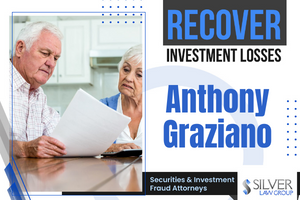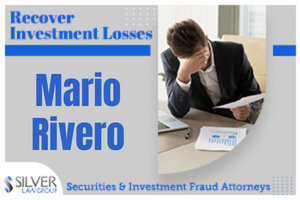Stockbrokers Are Not Supposed To Take Gifts, Loans Or Cash From Clients
 Michael Lian (Michael Emile Lian CRD# 2639356) is a previously registered broker whose last known employer was National Securities Corporation (CRD#:7569) of Clearwater, FL. His previous employers include Aegis Capital Corp. (CRD#:15007), National Securities Corporation (CRD#:7569), and Newbridge Securities Corporation (CRD#:104065), all in Red Bank, NJ. He has been in the industry since 1995. Continue reading ›
Michael Lian (Michael Emile Lian CRD# 2639356) is a previously registered broker whose last known employer was National Securities Corporation (CRD#:7569) of Clearwater, FL. His previous employers include Aegis Capital Corp. (CRD#:15007), National Securities Corporation (CRD#:7569), and Newbridge Securities Corporation (CRD#:104065), all in Red Bank, NJ. He has been in the industry since 1995. Continue reading ›
 Securities Arbitration Lawyers Blog
Securities Arbitration Lawyers Blog


 Douglas Rosenberg and Adam Maggio, brokers who currently work for and previously worked for Joseph Stone Capital, respectively, have been suspended. Both have been accused of churning accounts by customers.
Douglas Rosenberg and Adam Maggio, brokers who currently work for and previously worked for Joseph Stone Capital, respectively, have been suspended. Both have been accused of churning accounts by customers.  Joseph Audia (Joseph Scott Audia CRD#
Joseph Audia (Joseph Scott Audia CRD#  Anthony Graziano (Anthony Joseph Graziano CRD#
Anthony Graziano (Anthony Joseph Graziano CRD#  Narith Long (CRD#
Narith Long (CRD#  Todd Kling (Todd Franklin Kling CRD#
Todd Kling (Todd Franklin Kling CRD# ![Joseph Fedorko (Joseph Michael Fedorko CRD#] 2007317) is a previously registered broker whose last known employer was Laidlaw & Company (UK) LTD. (CRD#:119037) of Greenwich, CT. His previous employers include Oppenheimer & Co. Inc. (CRD#:249) of Stamford, CT, Josephthal & Co., Inc. (CRD#:3227) and Gruntal & Co., L.L.C. (CRD#:372), both of New York, NY. He has been in the industry since 1989. Fedorko has a total of 19 disclosures dating back to 1995. However, the most recent disclosure is from FINRA, after he excessively traded in the account a married senior couple from January 1, 2014, to December 31, 2019. He exercised de facto control over the couple’s account, and the couple trusted his recommendations. During this period, Fedorko and his firm (Laidlaw) exercised more than 1,200 transactions in the customers’ account. This excess trading led to losses of approximately $1.1 million, known as “churning.” However, the trading also generated $760,000 in commissions and markups for the firm, with Fedorko receiving 25% of the commissions and markups. After the customers filed a claim, the firm reimbursed them for their losses and closed their arbitration.](https://www.silverlaw.com/blog/wp-content/uploads/2022/03/Joseph-Fedorko.png) Joseph Fedorko (Joseph Michael Fedorko CRD#]
Joseph Fedorko (Joseph Michael Fedorko CRD#]  Mario Rivero Jr. (Mario Everildo Rivero Jr., CRD#
Mario Rivero Jr. (Mario Everildo Rivero Jr., CRD# 